Unity Manual
- Unity 6 Preview User Manual
- What's new in Unity
- Packages and feature sets
- Released packages
- 2D Animation
- 2D Aseprite Importer
- 2D Pixel Perfect
- 2D PSD Importer
- 2D SpriteShape
- 2D Tilemap Extras
- Adaptive Performance
- Addressables
- Addressables for Android
- Ads Mediation
- Advertisement Legacy
- AI Navigation
- Alembic
- Analytics
- Android Logcat
- Animation Rigging
- Apple ARKit XR Plugin
- AR Foundation
- Authentication
- Build Automation
- Burst
- CCD Management
- Cinemachine
- Cloud Code
- Cloud Diagnostics
- Cloud Save
- Code Coverage
- Collections
- Dedicated Server
- Deployment
- Device Simulator Devices
- Economy
- Editor Coroutines
- Entities
- Entities Graphics
- FBX Exporter
- Friends
- Google ARCore XR Plugin
- Havok Physics for Unity
- In App Purchasing
- Input System
- iOS 14 Advertising Support
- JetBrains Rider Editor
- Leaderboards
- Live Capture
- Lobby
- Localization
- Magic Leap XR Plugin
- Matchmaker
- Mathematics
- Memory Profiler
- Microsoft GDK API
- Microsoft GDK Tools
- ML Agents
- Mobile Notifications
- Multiplay
- Multiplayer Play Mode
- Multiplayer Tools
- Muse Sprite Tool
- Muse Texture Tool
- Netcode for Entities
- Netcode for GameObjects
- Oculus XR Plugin
- OpenXR Plugin
- Performance testing API
- Player Accounts
- Polybrush
- Post Processing
- ProBuilder
- Profile Analyzer
- Push Notifications
- Python Scripting
- Recorder
- Relay
- Remote Config
- Scriptable Build Pipeline
- Sequences
- Services Tooling
- SharpZipLib
- Splines
- Sysroot Base
- Sysroot Linux x64
- System Metrics Mali
- Terrain Tools
- Test Framework
- Timeline
- Toolchain Linux x64
- Toolchain MacOS Arm64 Linux x64
- Toolchain MacOS Linux x64
- Toolchain Win Linux x64
- Toolchain WinArm64 Linux x64
- Tutorial Authoring Tools
- Tutorial Framework
- Unity Logging
- Unity OpenXR Meta
- Unity Physics
- Unity Profiling Core API
- Unity Transport
- User Generated Content
- User Generated Content Bridge
- User Reporting
- Version Control
- Visual Scripting
- Visual Studio Editor
- Vivox
- WebGL Publisher
- XR Hands
- XR Interaction Toolkit
- XR Plugin Management
- ZivaRT Player
- Release candidates
- Pre-release packages
- Core packages
- Built-in packages
- Accessibility
- AI
- AMD
- Android JNI
- Animation
- Asset Bundle
- Audio
- Cloth
- Director
- Image Conversion
- IMGUI
- JSONSerialize
- NVIDIA
- Particle System
- Physics
- Physics 2D
- Screen Capture
- Terrain
- Terrain Physics
- Tilemap
- UI
- UIElements
- Umbra
- Unity Analytics
- Unity Web Request
- Unity Web Request Asset Bundle
- Unity Web Request Audio
- Unity Web Request Texture
- Unity Web Request WWW
- Vehicles
- Video
- VR
- Wind
- XR
- Experimental packages
- Packages by keywords
- Unity's Package Manager
- How Unity works with packages
- Concepts
- Configuration
- Package Manager window
- Access the Package Manager window
- Navigation panel
- List panel
- Details panel
- Features (details panel)
- Finding packages and feature sets
- Add and remove UPM packages or feature sets
- Install a feature set from the Unity registry
- Install a UPM package from a registry
- Install a UPM package from the Asset Store
- Install a UPM package from a local folder
- Install a UPM package from a local tarball file
- Install a UPM package from a Git URL
- Install a UPM package by name
- Remove a UPM package from a project
- Switch to another version of a UPM package
- Add and remove asset packages
- Disable a built-in package
- Perform an action on multiple packages
- Finding package documentation
- Inspecting packages
- Scripting API for packages
- Scoped registries
- Resolution and conflict
- Project manifest
- Troubleshooting
- Creating custom packages
- Feature sets
- Released packages
- Install Unity
- System requirements for Unity 6 Preview
- Install Unity from the command line
- Install Unity offline without the Hub
- Deploy Unity across your enterprise
- Enable Unity installation by standard users (Windows)
- Use Unity through web proxies
- Enable automatic proxy configuration
- Store credentials for automatic proxy configuration (Windows)
- Store credentials for automatic proxy configuration (macOS)
- Trusting the web proxy security certificate
- Use environment variables to identify your web proxy
- Create a command file to set environment variables and open applications
- Define exceptions on your web proxy
- Licenses and activation
- Upgrade Unity
- Create with Unity
- 2D or 3D projects
- Unity's interface
- The Project window
- The Scene view
- The Game view
- Device Simulator
- The Hierarchy window
- The Inspector window
- Editing properties
- The Toolbar
- The status bar
- The Background Tasks window
- Console Window
- Additional windows
- Undo
- Search in the Editor
- Customizing your workspace
- Unity shortcuts
- Quickstart guides
- Advanced best practice guides
- Create Gameplay
- Editor Features
- Analysis
- Memory in Unity
- Profiler overview
- Profiling your application
- Common Profiler markers
- The Profiler window
- Asset Loading Profiler module
- Audio Profiler module
- CPU Usage Profiler module
- File Access Profiler module
- Global Illumination Profiler module
- GPU Usage Profiler module
- Highlights Profiler Module
- Memory Profiler module
- Physics Profiler module
- Physics 2D Profiler module
- Rendering Profiler module
- UI and UI Details Profiler
- Video Profiler module
- Virtual Texturing Profiler module
- Customizing the Profiler
- Low-level native plug-in Profiler API
- Profiling tools
- Log files
- Understanding optimization in Unity
- Asset loading metrics
- Asset workflow
- Input
- 2D game development
- Introduction to 2D
- 2D game development quickstart guide
- 2D Sorting
- Work with sprites
- Tilemaps
- Essential tilemap steps and tools
- Active brush
- Create Tilemaps
- Create tile assets
- Create a Tile Palette
- Tile Palette editor tools
- Using the Select tool
- Move selected tiles with the Move tool
- Paint tiles with the Paint tool
- Use the Box Fill tool to fill an area with duplicated tiles
- Select tiles on the tilemap or Tile Palette with the Pick tool
- Remove tiles from the tilemap with the Eraser tool
- Fill an empty area with tiles with the Flood Fill tool
- Brush Picks
- Tilemap Collider 2D component reference
- Hexagonal Tilemaps
- Isometric Tilemaps
- Scriptable Tiles
- Scriptable Brushes
- Tile Palette visual elements
- Tilemap component reference
- Grid component reference
- Tilemap Renderer component reference
- Tile asset reference
- Tile Palette preferences reference
- Tile Palette editor reference
- Brush Inspector window reference
- Essential tilemap steps and tools
- Physics 2D Reference
- Graphics
- Render pipelines
- Render pipelines introduction
- Render pipeline feature comparison
- How to get, set, and configure the active render pipeline
- Choosing and configuring a render pipeline and lighting solution
- Using the Built-in Render Pipeline
- Using the Universal Render Pipeline
- Using the High Definition Render Pipeline
- Scriptable Render Pipeline fundamentals
- Creating a custom render pipeline
- Cameras
- Lighting
- Introduction to lighting
- Light sources
- Shadows
- The Lighting window
- Lighting Settings Asset
- The Light Explorer window
- Lightmapping
- Realtime Global Illumination using Enlighten
- Light Probes
- Reflection Probes
- Precomputed lighting data
- Debug Draw Modes for lighting
- Models
- Meshes
- Textures
- Importing Textures
- Texture Import Settings
- Default Import Settings reference
- Normal map Import Settings reference
- Editor GUI and Legacy GUI Import Settings reference
- Sprite (2D and UI) Import Settings reference
- Cursor Import Settings reference
- Cookie Import Settings reference
- Lightmap Import Settings reference
- Directional Lightmap Import Settings reference
- Shadowmask Import Settings reference
- Single Channel Import Settings reference
- Texture Import Settings
- Texture formats
- Mipmaps
- Render Texture
- Custom Render Textures
- Movie Textures
- 3D textures
- Texture arrays
- Cubemaps
- Cubemap arrays
- Streaming Virtual Texturing
- Streaming Virtual Texturing requirements and compatibility
- How Streaming Virtual Texturing works
- Enabling Streaming Virtual Texturing in your project
- Using Streaming Virtual Texturing in Shader Graph
- Cache Management for Virtual Texturing
- Marking textures as "Virtual Texturing Only"
- Virtual Texturing error material
- Sparse Textures
- Loading texture and mesh data
- Importing Textures
- Shaders
- Shaders core concepts
- Built-in shaders
- Standard Shader
- Standard Particle Shaders
- Autodesk Interactive shader
- Legacy Shaders
- Using Shader Graph
- Writing shaders
- Writing shaders overview
- ShaderLab
- ShaderLab: defining a Shader object
- ShaderLab: defining a SubShader
- ShaderLab: defining a Pass
- ShaderLab: adding shader programs
- ShaderLab: specifying package requirements
- ShaderLab: commands
- ShaderLab: grouping commands with the Category block
- ShaderLab command: AlphaToMask
- ShaderLab command: Blend
- ShaderLab command: BlendOp
- ShaderLab command: ColorMask
- ShaderLab command: Conservative
- ShaderLab command: Cull
- ShaderLab command: Offset
- ShaderLab command: Stencil
- ShaderLab command: UsePass
- ShaderLab command: GrabPass
- ShaderLab command: ZClip
- ShaderLab command: ZTest
- ShaderLab command: ZWrite
- ShaderLab legacy functionality
- HLSL in Unity
- Preprocessor directives in HLSL
- Shader semantics
- Accessing shader properties in Cg/HLSL
- Providing vertex data to vertex programs
- Built-in shader include files
- Built-in macros
- Built-in shader helper functions
- Built-in shader variables
- Shader data types and precision
- Using sampler states
- GLSL in Unity
- Example shaders
- Writing Surface Shaders
- Writing shaders for different graphics APIs
- Understanding shader performance
- Materials
- Visual effects
- Post-processing and full-screen effects
- Particle systems
- Choosing your particle system solution
- Built-in Particle System
- Using the Built-in Particle System
- Particle System vertex streams and Standard Shader support
- Particle System GPU Instancing
- Particle System C# Job System integration
- Components and Modules
- Particle System
- Particle System modules
- Main module
- Emission module
- Shape module
- Velocity over Lifetime module
- Noise module
- Limit Velocity over Lifetime module
- Inherit Velocity module
- Lifetime by Emitter Speed module
- Force over Lifetime module
- Color over Lifetime module
- Color by Speed module
- Size over Lifetime module
- Size by Speed module
- Rotation over Lifetime module
- Rotation by Speed module
- External Forces module
- Collision module
- Triggers module
- Sub Emitters module
- Texture Sheet Animation module
- Lights module
- Trails module
- Custom Data module
- Renderer module
- Particle System Force Field
- Visual Effect Graph
- Decals and projectors
- Lens flares and halos
- Lines, trails, and billboards
- Sky
- Color
- Graphics API support
- Graphics performance and profiling
- Render pipelines
- World building
- Physics
- Built-in 3D Physics
- Character control
- Rigidbody physics
- Collision
- Joints
- Articulations
- Ragdoll physics
- Cloth
- Multi-scene physics
- Physics Debug window reference
- Built-in 3D Physics
- Scripting
- Get started
- Unity scripting fundamentals
- Code reload in the Unity Editor
- Split tasks across frames or threads
- Scripting backends
- Script compilation
- Script serialization
- Plug-ins
- Unity Properties
- UnityWebRequest
- Multiplayer
- Audio
- Audio overview
- Audio files
- Tracker Modules
- Audio Mixer
- Native audio plug-in SDK
- Audio playlist randomization
- Audio Profiler
- Ambisonic Audio
- Audio Reference
- Audio Clip
- Audio Listener
- Audio Source
- Audio Mixer
- Audio Filters
- Audio Effects
- Audio Low Pass Effect
- Audio High Pass Effect
- Audio Echo Effect
- Audio Flange Effect
- Audio Distortion Effect
- Audio Normalize Effect
- Audio Parametric Equalizer Effect
- Audio Pitch Shifter Effect
- Audio Chorus Effect
- Audio Compressor Effect
- Audio SFX Reverb Effect
- Audio Low Pass Simple Effect
- Audio High Pass Simple Effect
- Reverb Zones
- Microphone
- Audio Settings
- Video overview
- Animation
- Animation system overview
- Rotation in animations
- Animation Clips
- Animator Controllers
- Retargeting of Humanoid animations
- Performance and optimization
- Animation Reference
- Animation FAQ
- Playables API
- A Glossary of animation terms
- Legacy Animation system
- User interface (UI)
- Comparison of UI systems in Unity
- UI Toolkit
- Get started with UI Toolkit
- UI Builder
- Structure UI
- The visual tree
- Structure UI with UXML
- Structure UI with C# scripts
- Custom controls
- Best practices for managing elements
- Encapsulate UXML documents with logic
- UXML elements reference
- UXML element BindableElement
- UXML element VisualElement
- UXML element BoundsField
- UXML element BoundsIntField
- UXML element Box
- UXML element Button
- UXML element ColorField
- UXML element CurveField
- UXML element DoubleField
- UXML element DropdownField
- UXML element EnumField
- UXML element EnumFlagsField
- UXML element FloatField
- UXML element Foldout
- UXML element GradientField
- UXML element GroupBox
- UXML element Hash128Field
- UXML element HelpBox
- UXML element IMGUIContainer
- UXML element Image
- UXML element InspectorElement
- UXML element IntegerField
- UXML element Label
- UXML element LayerField
- UXML element LayerMaskField
- UXML element LongField
- UXML element ListView
- UXML element MaskField
- UXML element MinMaxSlider
- UXML element MultiColumnListView
- UXML element MultiColumnTreeView
- UXML element ObjectField
- UXML element PopupWindow
- UXML element ProgressBar
- UXML element PropertyField
- UXML element RadioButton
- UXML element RadioButtonGroup
- UXML element RectField
- UXML element RectIntField
- UXML element RepeatButton
- UXML element RenderingLayerMaskField
- UXML element ScrollView
- UXML element Scroller
- UXML element Slider
- UXML element SliderInt
- UXML element Tab
- UXML element TabView
- UXML element TagField
- UXML element TextElement
- UXML element TextField
- UXML element TemplateContainer
- UXML element Toggle
- UXML element ToggleButtonGroup
- UXML element Toolbar
- UXML element ToolbarBreadcrumbs
- UXML element ToolbarButton
- UXML element ToolbarMenu
- UXML element ToolbarPopupSearchField
- UXML element ToolbarSearchField
- UXML element ToolbarSpacer
- UXML element ToolbarToggle
- UXML element TreeView
- UXML element TwoPaneSplitView
- UXML element UnsignedLongField
- UXML element UnsignedIntegerField
- UXML element Vector2Field
- UXML element Vector2IntField
- UXML element Vector3Field
- UXML element Vector3IntField
- UXML element Vector4Field
- Structure UI examples
- Create list and tree views
- Create a complex list view
- Create a list view runtime UI
- Wrap content inside a scroll view
- Create a tabbed menu
- Create a pop-up window
- Use Toggle to create a conditional UI
- Create a custom control with two attributes
- Create a slide toggle custom control
- Create a bindable custom control
- Create a custom style for a custom control
- Create a drag-and-drop list and tree views between windows
- Create an aspect ratio custom control
- Style UI
- UI Toolkit Debugger
- Control behavior with events
- UI Renderer
- Data binding
- Comparison of the binding systems
- Runtime data binding
- SerializedObject data binding
- Introduction to SerializedObject data binding
- Bindable elements reference
- Bindable data types and fields
- Binding system implementation details
- Binding examples
- Bind with binding path in C# script
- Bind without the binding path
- Bind with UXML and C# script
- Create a binding with the Inspector
- Bind to nested properties
- Bind to a UXML template
- Receive callbacks when a bound property changes
- Receive callbacks when any bound properties change
- Bind to a list with ListView
- Bind to a list without ListView
- Bind a custom control
- Bind a custom control to custom data type
- Support for Editor UI
- Support for runtime UI
- Work with text
- Examples
- Migration guides
- Unity UI
- Immediate Mode GUI (IMGUI)
- Unity Services
- Setting up your project for Unity services
- Unity Organizations
- Unity Ads
- Unity Analytics
- Unity Cloud Content Delivery
- Unity Build Automation (formerly Cloud Build)
- Unity IAP
- Setting up Unity IAP
- Cross Platform Guide
- Codeless IAP
- Defining products
- Subscription Product support
- Initialization
- Browsing Product Metadata
- Initiating Purchases
- Processing Purchases
- Handling purchase failures
- Restoring Transactions
- Purchase Receipts
- Receipt validation
- Store Extensions
- Cross-store installation issues with Android in-app purchase stores
- Store Guides
- Implementing a Store
- Unity Cloud Diagnostics
- Unity Integrations
- Multiplayer Services
- Unity Distribution Portal
- Unity Accelerator
- XR
- Unity's Asset Store
- Asset Store packages
- Publish to the Asset Store
- Creating your Publisher Account
- Creating a new package draft
- Deleting a package draft
- Uploading assets to your package
- Filling in the package details
- Submitting your package for approval
- Viewing the status of your Asset Store submissions
- Collecting revenue
- Providing support to your customers
- Adding tags to published packages
- Connecting your account to Google Analytics
- Promoting your Assets
- Refunding your customers
- Upgrading packages
- Deprecating your Assets
- Issuing vouchers
- Managing your publishing team
- Asset Store Publisher portal
- Verified Solutions
- Platform development
- Using Unity as a Library in other applications
- Deep linking
- Xcode frame debugger Unity integration
- Build path requirements for target platforms
- Android
- Introducing Android
- Getting started with Android
- Developing for Android
- Android mobile scripting
- Input for Android devices
- Android application size restrictions
- Graphics for Android
- Testing and debugging
- Optimization for Android
- Create and use plug-ins in Android
- Integrating Unity into Android applications
- Android application entry points
- Deep linking on Android
- Device features and permissions
- Handle Android crashes
- Quit a Unity Android application
- Building and delivering for Android
- Dedicated Server
- iOS
- Introducing iOS
- Getting started with iOS
- Developing for iOS
- iOS Scripting
- Input for iOS devices
- Unity's Device Simulator for iOS
- Unity Remote
- Managed stack traces on iOS
- Optimize performance for iOS
- Native plug-ins for iOS
- Integrating Unity into native iOS applications
- Deep linking on iOS
- iOS authorizations in Unity
- Prepare your application for in-app purchases
- Social API
- Troubleshooting on iOS devices
- Reporting crash bugs for iOS
- Building and delivering for iOS
- Linux
- macOS
- tvOS
- visionOS
- Web
- Web introduction
- Web development
- Web Player settings
- Interaction with browser scripting
- Code examples: Call JavaScript and C/C++/C# functions in Unity
- Set up your JavaScript plug-in
- Call JavaScript functions from Unity C# scripts
- Call Unity C# script functions from JavaScript
- Call C/C++/C# functions from Unity C# scripts
- Compile a static library as a Unity plug-in
- Create callbacks between Unity C#, JavaScript, and C/C++/C# code
- Replace deprecated browser interaction code
- Web native plug-ins for Emscripten
- Memory in Unity Web
- Cache behavior in Web
- Web graphics
- Audio in Web
- Video playback in Web
- Texture compression in Web
- Embedded resources in Web
- WebAssembly 2023
- Web performance considerations
- Debug and troubleshoot Web builds
- Build and distribute a Web application
- Web Build Settings
- Build your Web application
- Optimize your Web build
- Recommended Graphics settings to optimize your Web build
- Recommended Player settings to optimize your Web build
- Recommended Quality settings to optimize your Web build
- Use C# code to enable optimization settings
- Optimize Web platform for mobile
- Web templates
- Deploy a Web application
- Server configuration code samples
- Windows
- Universal Windows Platform
- Introduction to Universal Windows Platform
- Get started with Universal Windows Platform
- Develop for Universal Windows Platform
- Build and deliver for Universal Windows Platform
- Unity Search
- Glossary
- Graphics
- Graphics performance and profiling
- Debug frames in Unity
- Frame Debugger event information
Frame Debugger event information
The Event Information Panel in the Frame Debugger window displays information about the event such as geometry details and the shaderA program that runs on the GPU. More info
See in Glossary used for a draw call.
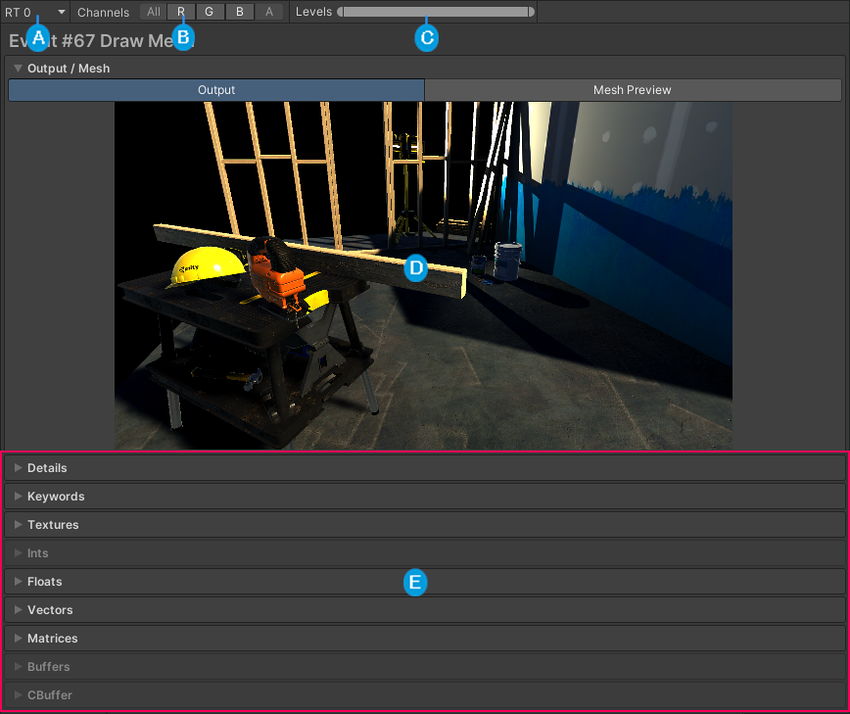
| Label | Description |
|---|---|
 |
Render target selector: When rendering into multiple render targets (such as multiple RenderTextures or when also rendering to depth), this specifies which render target to display in the Game view. This is useful for example to view individual render targets in a G-buffer. |
 |
Color channel selector: Specifies which color channels of the render target to display. |
 |
Levels: Controls the black and white intensity. Use this to isolate areas of the Game view based on light intensity. |
 |
Output / MeshThe main graphics primitive of Unity. Meshes make up a large part of your 3D worlds. Unity supports triangulated or Quadrangulated polygon meshes. Nurbs, Nurms, Subdiv surfaces must be converted to polygons. More info See in Glossary Preview: Displays a preview of the selected event output as well as the mesh geometry in the event. For more information, see Preview. |
 |
Event properties: Contains further information about the selected event. For more information, see Event properties. |
Preview
The preview section consists of two tabs:
- The Output tab displays a preview of the selected event output.
- The Mesh Preview tab displays the mesh geometry Unity rendered in the event.
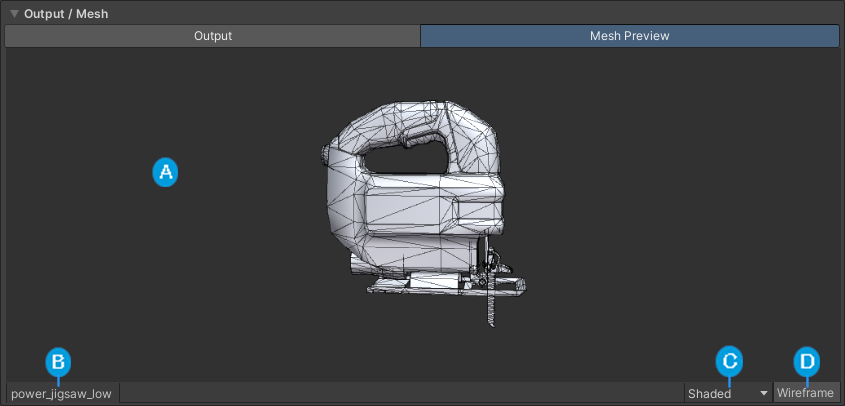
| Label | Description |
|---|---|
 |
Preview: A preview of the mesh geometry Unity rendered during the event. |
 |
Mesh name: The name of the mesh asset in the preview. Click on the mesh name to take see the mesh asset in the Project windowA window that shows the contents of your Assets folder (Project tab) More infoSee in Glossary. If the geometry was procedural and there is no mesh asset associated, this is empty (Unity displays -). |
 |
Preview mode: Specifies how the preview renders the mesh. The options are: • Shaded: Renders the mesh using its material and a basic light. • UV Checker: Applies a checkerboard texture to the mesh to visualize how the mesh’s UV map applies textures.. • UV Layout: Displays how the vertices of the mesh are organized in the unwrapped UV map. This view disables the Wireframe toggle. • Vertex Color: Visualizes any vertex colors that the vertices in this mesh have. If no vertices have a vertex color, this option is unavailable. • Normals: Visualizes the relative directions of the normals in the mesh with color. • Tangents: Visualizes the tangent data in the mesh with color. • Blendshapes: Visualizes blend shape deformations on the mesh. If the mesh has no blend shapes, this option is unavailable. |
 |
Wireframe toggle: Toggles the mesh wireframe on and off. When enabled, the preview displays the mesh vertices and edges. |
Event properties
The event properties section contains properties and values for the selected event. It has a Details fold-out section that contains information about the event itself and then a fold-out section for each type of shader property. If the fold-out section is grayed-out, it means that the shader in the event didn’t contain any properties of that type. For more information on the information that each section displays, see:
- Details
- Keywords
- TexturesAn image used when rendering a GameObject, Sprite, or UI element. Textures are often applied to the surface of a mesh to give it visual detail. More info
See in Glossary - Ints
- Floats
- Vectors
- Matrices
- Buffers
- Constant Buffers
Note: When using OpenGL and GLSL shaders, this panel displays all shader properties as being part of the vertex stage.
Details
The Details section displays information about the rendering event, such as the number of draw calls as well as the meshes that Unity rendered and the shader it used to render them.
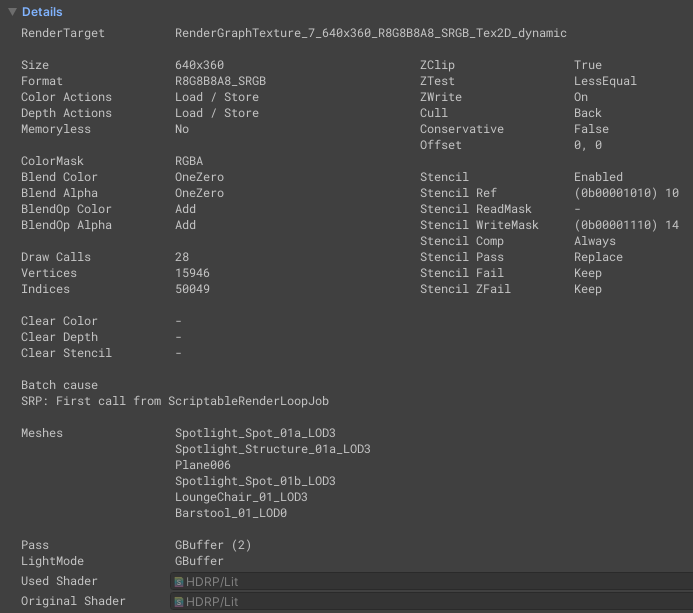
| Property | Description |
|---|---|
| RenderTarget | The name of the render target |
| Size | The size of the render target. |
| Format | The TextureFormat for the render target. |
| Color Actions | Shows which actions to perform on the color target when: • The GPU first loads the color target. For more information, see RenderBufferLoadAction. • The GPU finishes rendering to the color target. For more information, see RenderBufferStoreAction. |
| Depth Actions | Shows which actions to perform on the depth target when: • The GPU first loads the depth target. For more information, see RenderBufferLoadAction. • The GPU finishes rendering to the depth target. For more information, see RenderBufferStoreAction. |
| Memoryless | The render textureA special type of Texture that is created and updated at runtime. To use them, first create a new Render Texture and designate one of your Cameras to render into it. Then you can use the Render Texture in a Material just like a regular Texture. More info See in Glossary memoryless mode mode. For more information, see memoryless. |
| ColorMask | The color channel mask used for the render target. For more information, see ColorMask. |
| Blend Color | The color blending method Unity used during the selected event. |
| Blend Alpha | The alpha blending method Unity used during the selected event. |
| BlendOp Color | The color blending operation Blend Color used. |
| BlendOp Alpha | The alpha blending operation Blend Alpha used. |
| Draw Calls | The number of draw calls Unity processed during the selected event. |
| Vertices | The number of vertices Unity processed during the select event. |
| Indices | The number of indices Unity processed during the select event. |
| Clear Color | The color Unity used to clear the render target during the selected event. If Unity didn’t clear the render target, the display doesn’t show a color here. |
| Clear Depth | The color Unity used to clear the depth bufferA memory store that holds the z-value depth of each pixel in an image, where the z-value is the depth for each rendered pixel from the projection plane. More info See in Glossary during the selected event. If Unity didn’t clear the depth buffer, the display doesn’t show a color here. |
| Clear Stencil | The color Unity used to clear the stencil bufferA memory store that holds an 8-bit per-pixel value. In Unity, you can use a stencil buffer to flag pixels, and then only render to pixels that pass the stencil operation. More info See in Glossary during the selected event. If Unity didn’t clear the stencil buffer, the display doesn’t show a color here. |
| Batch cause | The reason why the SRP Batcher was unable to batch the selected rendering event with the previous rendering event. This is only relevant if your application uses the SRP Batcher. |
| Meshes | The list of meshes that Unity rendered during the selected event. |
| Pass | The shader Pass Unity used. |
| LightMode | The LightMode pass tag Unity used during the selected event. |
| Used Shader | The shader asset Unity used during the selected event. This can sometimes be different than the original shader, for example when the original shader uses a fallback shader or USEPASS. |
| Original Shader | The original shader Unity used with the pass. |
| ZClip | The shader’s depth clip mode. |
| ZTest | The shader’s depth test mode. |
| ZWrite | The shader’s depth clip mode. |
| Cull | The shader’s cull mode. |
| Conservative | Indicates whether the shader used conservative rasterization. |
| Offset | The depth bias on the GPU that Unity used during the selected event. |
| Stencil | Indicates whether Stencil is enabled in the selected event. For more information, see Stencil. |
| Stencil Ref | The stencil reference value. |
| Stencil ReadMask | The stencil readmask value Unity used to perform the stencil test. |
| Stencil WriteMask | The stencil writemask value Unity used to write to the stencil buffer. |
| Stencil Comp | The operation that the GPU performed for the stencil test for all pixelsThe smallest unit in a computer image. Pixel size depends on your screen resolution. Pixel lighting is calculated at every screen pixel. More info See in Glossary. |
| Stencil Pass | The operation that the GPU performed on the stencil buffer for pixels that passed both the stencil test and the depth test. |
| Stencil Fail | The operation that the GPU performed on the stencil buffer for pixels that failed the stencil test. |
| Stencil ZFail | The operation that the GPU performed on the stencil buffer for pixels that passed the stencil test but failed the depth test. |
Keywords
This section displays information about the enabled shader keywords Unity used in the rendering event.
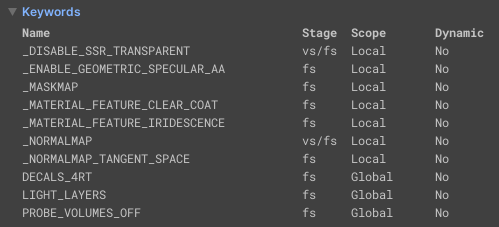
| Property | Description |
|---|---|
| Name | The name of the shader keyword. |
| Stage | The shader stage that Unity used the shader keyword in. The possible values are: • vs: Vertex Shader • fs: Fragment Shader • gs: Geometry Shader • hs: Hull Shader • ds: Domain Shader |
| Scope | Indicates whether the scope of the keyword is global or local. For more information, see Declaring keywords. |
| Dynamic | Indicates whether the keyword is dynamic or not. For more information, see Declaring and using shader keywords in HLSL. |
Textures
The Texture section displays information about the named textures Unity used during the rendering event.

| Property | Description |
|---|---|
| Name | The property name for the texture. |
| Stage | The shader stage that Unity used the texture in. The possible values are: • vs: Vertex Shader • fs: Fragment Shader • gs: Geometry Shader • hs: Hull Shader • ds: Domain Shader |
| Size | The size of the texture. This is the width and height for 2D textures and width, height, and depth for 3D textures, |
| Sampler Type | Indicates type of a Texture (such as 2D Texture, cubemap, or 3D volume texture). |
| Color Format | The color format that the texture uses. For more information on RenderTexture formats, see GraphicsFormat. For more information on formats for other texture types, see TextureFormat. |
| Depth Stencil Format | The depth stencil format for the RenderTexture. For more information, see RenderTexture.depthStencilFormat. Note: If the texture isn’t a RenderTexture, Unity doesn’t display a graphics format here. |
| Texture | The texture name. |
Ints
The Ints section displays information about the named int values Unity used during the rendering event.

| Property | Description |
|---|---|
| Name | The name of the int property in the shader. |
| Stage | The shader stage that Unity used the int property in. The possible values are: • vs: Vertex Shader • fs: Fragment Shader • gs: Geometry Shader • hs: Hull Shader • ds: Domain Shader |
| Value | The value of the int property. |
Floats
The Floats section displays information about the named float values Unity used during the rendering event.
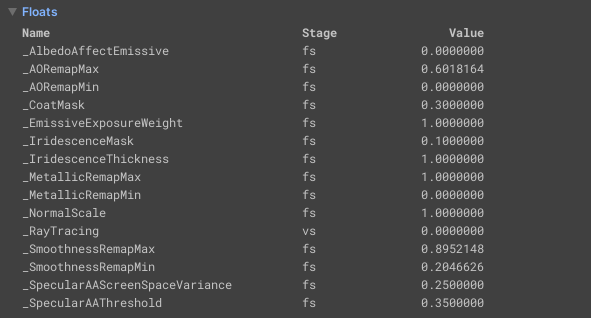
| Property | Description |
|---|---|
| Name | The name of the float property in the shader. |
| Stage | The shader stage that Unity used the float property in. The possible values are: • vs: Vertex Shader • fs: Fragment Shader • gs: Geometry Shader • hs: Hull Shader • ds: Domain Shader |
| Value | The value of the float property. |
Vectors
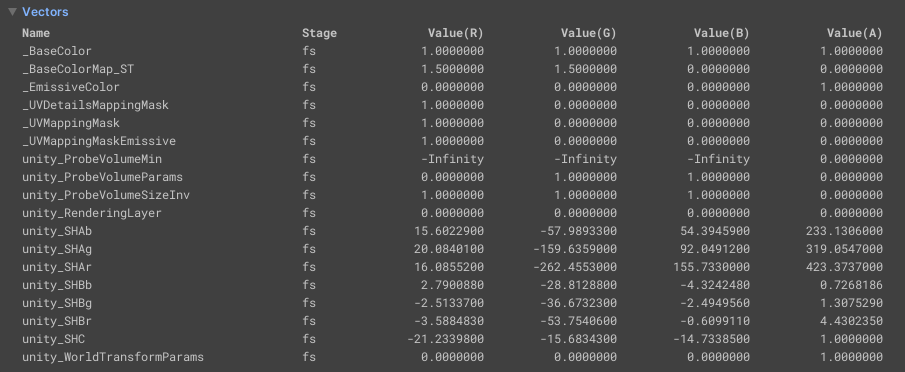
| Property | Description |
|---|---|
| Name | The name of the vector property in the shader. |
| Stage | The shader stage that Unity used the vector property in. The possible values are: • vs: Vertex Shader • fs: Fragment Shader • gs: Geometry Shader • hs: Hull Shader • ds: Domain Shader |
| Value(R) | The R component of the vector. |
| Value(G) | The G component of the vector. |
| Value(B) | The B component of the vector. |
| Value(A) | The A component of the vector. |
Matrices
The Matrices section displays information about the named matrix values Unity used during the rendering event.

| Property | Description |
|---|---|
| Name | The name of the matrix property in the shader. |
| Stage | The shader stage that Unity used the matrix property in. The possible values are: • vs: Vertex Shader • fs: Fragment Shader • gs: Geometry Shader • hs: Hull Shader • ds: Domain Shader |
| Column 0 | The values in the first column of the matrix. |
| Column 1 | The values in the second column of the matrix. |
| Column 2 | The values in the third column of the matrix. |
| Column 3 | The values in the fourth column of the matrix. |
Buffers
The Buffers section displays information about the named buffers Unity used during the rendering event.

| Property | Description |
|---|---|
| Name | The name of the buffer in the shader. |
| Stage | The shader stage that Unity used the buffer in. The possible values are: • vs: Vertex Shader • fs: Fragment Shader • gs: Geometry Shader • hs: Hull Shader • ds: Domain Shader |
Constant Buffers
This Constant Buffers section displays information about the named constant buffers Unity used during the rendering event.

| Property | Description |
|---|---|
| Name | The name of the constant buffer in the shader. |
| Stage | The shader stage that Unity used the constant buffer in. The possible values are: • vs: Vertex Shader • fs: Fragment Shader • gs: Geometry Shader • hs: Hull Shader • ds: Domain Shader |
Share event information
To help you share information for a particular event, the Frame Debugger window can copy the information in the user interface to the clipboard. It can copy information for a single property, for all the properties in a properties section, or for an entire event. This means you don’t need to take one or multiple screenshots to share the results of a frame capture.
To copy a single property and its values to the clipboard, right-click the property and select Copy Property.

To copy all the properties and their values from a properties section, right-click the properties section header and select Copy All <property type> Properties.
To copy all the information from the rendering event, right-click the event header and select Copy Event Info.